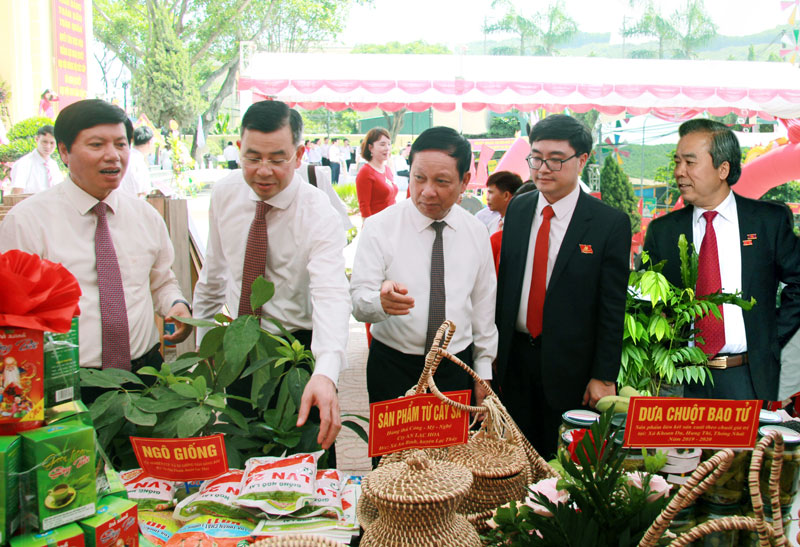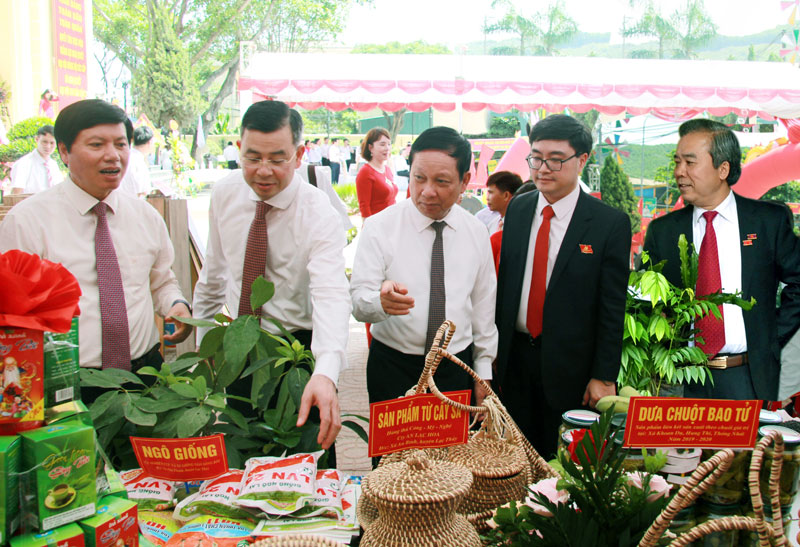
(HBO) - The agricultural sector of Hoa Binh province has made great efforts during 2015-2020 to overcome challenges and basically complete tasks set in the Resolution of the 6th congress of the Party organisation at the provincial Department of Agriculture and Rural Development.
The locality’s agriculture sector has recorded comprehensive
and sustainable development with high added value and ability to adapt to
climate change, contributing to improving the living standards for residents
living in rural areas.
 Provincial officials visit a booth
exhibiting high-quality farm produce of Lac Thuy district.
Provincial officials visit a booth
exhibiting high-quality farm produce of Lac Thuy district.
Hoa Binh achieved quite
comprehensive results in restructuring of agriculture over the last five years.
Many concentrated agricultural commodity production zones have been initially formed,
contributing to raising the average production value of each hectare of farm
land to 128.4 million VND (5,530 USD) per year, 2.4 percent higher than the set
target.
The locality’s livestock industry has proactively worked to control
diseases for cattle and poultry, while devising solutions to increase the
economic value of livestock of local strength such as pig, cow, buffalo, goat,
and poultry.
For the fishery sector, the aquaculture area has been expanded to 2,700 ha,
producing about 11,000 tonnes of products per year, double the output of 2015.
Meanwhile, the forestry sector has always overfulfilled annual
plans on forest planting, protection and development. The forest coverage in
Hoa Binh in 2020 stands at 51.5 percent, 3 percent higher than the set plan.
The sector’s annual growth averages 4.35 percent, twice as high as the
country’s growth rate.
Agricultural achievements made by the locality in the 2015-2020
period are expected to create an impetus for the agriculture and rural
development sector to make breakthroughs in the next five years.
The provincial Department of Agriculture and Rural Development will pay
attention to improving the leadership of its Party organisation and promoting
the unity, while effectively implementing patriotic emulation movements and
campaigns, thus contributing to promoting high-added value and sustainable agriculture
development, and accelerating the building of new-style rural areas.
The sector aims to have 100 percent of administrative procedures handled properly
and ahead of schedule; and 100 percent of tasks assigned by the provincial
People’s Committee completed on schedule./.
According to data from the Hoa Binh Provincial Party Committee, the industrial production index for the first six months of 2025 is estimated to have increased by 20% compared to the same period last year. This marks the highest year-on-year growth rate for this period since 2020.
In the first six months of 2025, Hoa Binh province’s export turnover was estimated at 1.145 billion USD, marking an 18.11% increase compared to the same period in 2024. Import turnover was estimated at $ 804 million, a 17.15% increase, which helped the province maintain a positive trade balance.
The lives of the ethnic minority farmers in Tan Lac district have gradually improved thanks to the new directions in agricultural production. This is a testament to the collective strength fostered through the professional associations and groups implemented by various levels of the district’s Farmers’ Union.
With the motto the "product quality comes first,” after nearly one year of establishment and operation, Muong village’s Clean Food Agricultural and Commercial Cooperative, located in Cau Hamlet, Hung Son Commune (Kim Boi district), has launched reputable, high-quality agricultural products to the market that are well-received by consumers. The products such as Muong village’s pork sausage, salt-cured chicken, and salt-cured pork hocks have gradually carved out a place in the market and they are on the path to obtaining the OCOP certification.
In the past, the phrase "bumper harvest, rock-bottom prices" was a familiar refrain for Vietnamese farmers engaged in fragmented, small-scale agriculture. But today, a new spirit is emerging across rural areas of Hoa Binh province - one of collaboration, organisation, and collective economic models that provide a stable foundation for production.
Maintaining growing area codes and packing facility codes in accordance with regulations is a mandatory requirement for agricultural products to be eligible for export. Recently, the Department of Agriculture and Environment of Hoa Binh province has intensified technical supervision of designated farming areas and packing facilities to safeguard the "green passport" that enables its products to access international markets.



 Provincial officials visit a booth
exhibiting high-quality farm produce of Lac Thuy district.
Provincial officials visit a booth
exhibiting high-quality farm produce of Lac Thuy district.